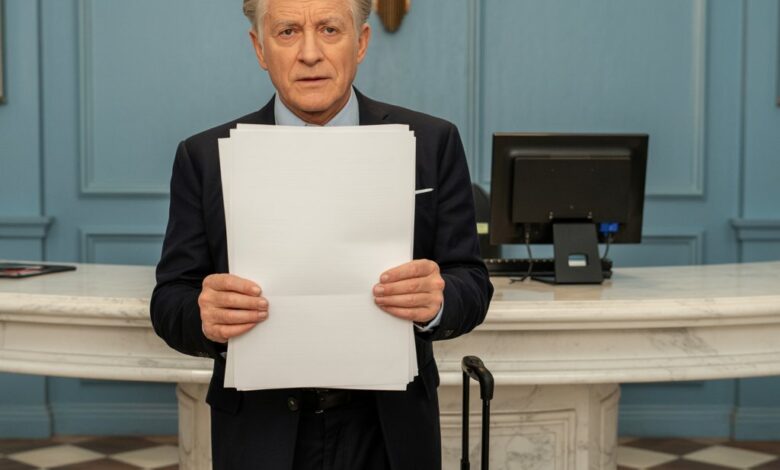My Family Left Grandpa at the Hotel to Avoid Paying – They Didn’t Realize I Was the Wrong Grandson to Mess With

My 74-year-old grandfather stood alone at the checkout desk of a luxury resort, holding a $12,000 bill he never agreed to. He had just retired after 52 years as a machinist—a man who never missed a day of work and gave without expecting anything in return. And now, at the end of what was supposed to be a family celebration, he was left behind.
When I walked into the hotel, the first thing I noticed was the scent of sunscreen and tropical flowers. Then I saw him—standing quietly by the front desk, shoulders slumped, holding the invoice in both hands.

“They told me it was their treat,” he said softly, barely making eye contact. “I didn’t want to cause trouble.”
They thought he’d stay silent. But they didn’t expect me.
A few months earlier, my aunt suggested we do something special for Grandpa’s birthday. My cousin Ashley jumped at the idea.
“Let’s take Grandpa somewhere nice,” she said. “Like a real beach resort. Luxury all the way.”
The plan sounded perfect. Ashley handled the arrangements: a seven-day, all-inclusive vacation at a high-end coastal resort. Five rooms. One especially for Grandpa, complete with a private balcony.
“He deserves this,” Ashley said. “After everything he’s done for us, it’s time he relaxes.”
When he asked about the cost, she smiled. “It’s our gift to you, Grandpa. Don’t worry about a thing.”
So he packed one small suitcase, his favorite fishing hat, and a pair of sandals he hadn’t worn in a decade. Off they went. The trip was all over social media—poolside selfies, gourmet dinners, drinks with tiny umbrellas. Hashtags like #FamilyFirst and #CelebratingTheKing filled their feeds.
I couldn’t make the whole week, but I booked a one-way ticket to meet him at the end and help him fly home. He always said airports made him feel lost.
When I arrived, the resort was quiet, the sun still warm in the sky. But something was wrong. Grandpa stood alone, suitcase by his side, the lobby empty except for him.
“They all left this morning,” he said. “Told me checkout was at noon. Ashley said I just needed to stop by the desk and sign something.”
Instead, he was handed an itemized bill. Room charges. Spa treatments. Cocktails. Boat rentals. Everything—five suites, every amenity—was billed under his name.
“Why didn’t you call me?” I asked, trying to steady my voice.
He shrugged. “Didn’t want to bother you. Figured I might have enough saved up.” He looked down. “I just didn’t want to make a fuss. At least they had fun.”
My hands tightened. I walked outside and called Ashley.
“Why did you leave Grandpa with a $12,000 bill?” I asked.
She laughed. “He’s retired. He’s not exactly broke.”
I stayed silent.
“We thought he could help out,” she added. “Like a thank-you trip… from him to us.”
“You thought that was okay?” I said, my voice low. “To dump twelve grand on a 74-year-old man without asking?”
“Don’t be so dramatic,” she replied. “You know Grandpa. He was just happy to be with everyone.”
I didn’t respond. Just stared at the resort entrance, watching laughter drift from the pool area.
“Let me make this clear,” I said. “He’s not the fool here. You are.”
Her tone soured. “Whatever. If it’s that big a deal, we can talk at Thanksgiving.”
Click.
I returned to the front desk. Grandpa was still apologizing for the confusion, blaming himself.
“Don’t worry,” I said loudly, so everyone could hear. “I’ve got this.”
He looked panicked. “That’s too much. Please—”
I stopped him. “It’s handled.”
I paid the full bill on my card. Then I turned to the manager. “I want an itemized list for each room,” I said. “Names, check-in and check-out times, and all signatures. Email it to me within the hour.”
She nodded.
Grandpa stood with his suitcase again, still unsure of what to do.
“We’re going home,” I said. “But first, milkshakes.”
He smiled. “You always did like chocolate.”

That night, I called a college friend who’s now an attorney. I gave him everything—hotel receipts, security footage, staff statements. The next morning, I drafted formal letters.
Each relative received one: clear, polite, firm. You are responsible for the following charges. Please remit payment within 14 days or I’ll pursue legal action for fraud, elder financial abuse, and abandonment in small claims court.
Their itemized charges were highlighted in yellow. Ashley’s was the largest—champagne, massages, a sunset cruise.
I sent Venmo requests with the note: Your share of Grandpa’s retirement trip. Due in 14 days.
No emojis. No jokes. Just facts.
Ashley paid first—silently, with an angry emoji in her name. Her brother followed. Then my aunt. Slowly, reluctantly, they all paid. No apologies. Some complaints.
“You didn’t have to go this far.”
“You made this public.”
“It was a misunderstanding.”
I said nothing. The paper trail spoke for itself. By the second week, all $12,000 was reimbursed—except Grandpa’s portion, which I never asked for.
One night over dinner, he said, “You shouldn’t have done that.”
“I wanted to,” I replied.
“I could’ve paid. I had the savings.”
“You shouldn’t have had to,” I said. “You earned that vacation. But the rest? That wasn’t your responsibility.”
He stared into his coffee, quiet. Then finally nodded. “Alright. Thank you.”
Thanksgiving came and went. No calls. No invitations. Grandpa wasn’t surprised.
“I guess I finally see them for who they are,” he said, eyes on the TV. “Took me long enough.”
“You weren’t blind,” I told him. “Just kind.”
He smiled. “Still am.”
These days, he gardens more. Says it helps him think. We meet for lunch often—sometimes to talk, sometimes just to sit together. He shares stories about machines he built decades ago. I always listen like it’s the first time.
He seems lighter now. Happier. Freer. That painful experience gave him something rare at his age: a new beginning.
And me? I don’t care if they speak to me again. Because if you think you can walk out on an old man and leave him with your bill—you’ve clearly never met his grandson.




